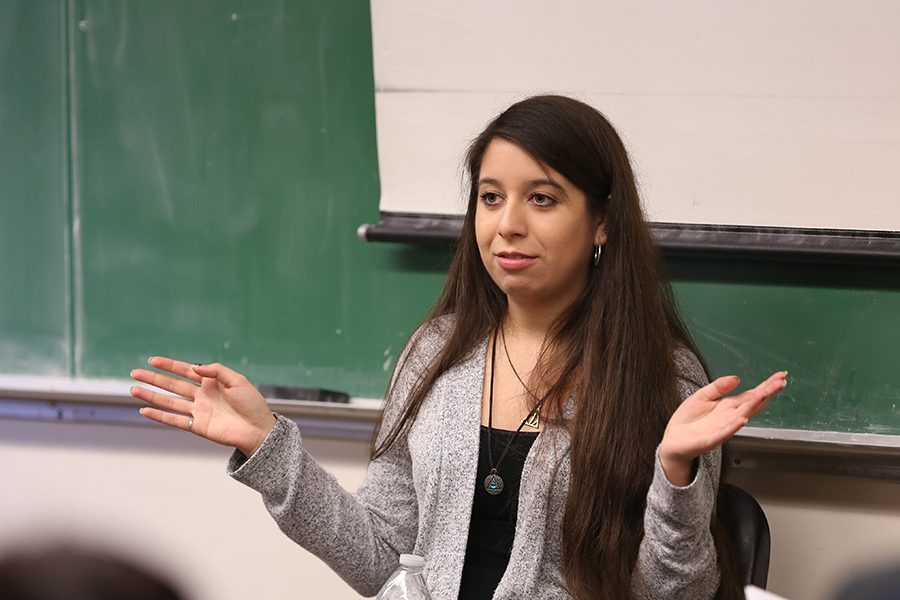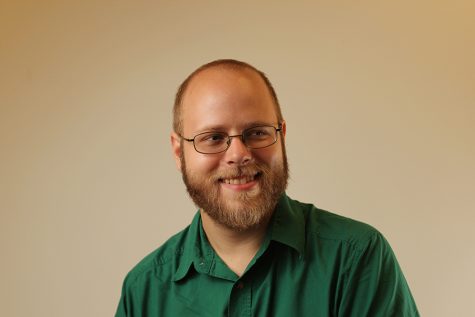Alumna discusses empirical research
Chemical engineer Gabriella Alva speaks to the crowd about her professional career during the Adelante STEM Academy’s STEM cafés. The cafés allow for professionals to discuss their careers with students.
Sep 28, 2016
A chemical engineer spoke on the need for determination, flexibility and social support when studying the hard sciences Thursday at one of Adelante STEM Academy’s STEM cafés.
The cafés allow professionals in STEM fields to come talk with STEM majors at Contra Costa College. In AA-109 at 1 p.m., Gabriela Alva, a graduate of Middle College High School and CCC, spoke to students.
MCHS is a program that allows high school students to attend college credit courses while simultaneously earning a high school diploma.
Minority Student Retention Specialist Kelly Ramos said Alva grew up in Berkeley and San Pablo. Alva said her family moved from Berkeley to San Pablo when she was 8 to save money. Alva said she was the first in her family to go to college.
“Dad finished middle school. Mom finished second grade,” she said.
Alva said her parents made her apply to MCHS, though she didn’t want to go.
“Coming here was awesome. I never actively thought about going to college until I started going to Middle College and talking to people.”
Alva said she didn’t like math and science when she started out. She started thinking about an English major, but said that despite the many short stories and poems she has written, English is her hobby, not her career.
MCHS student Nantahya Verweij said, “It’s nice to hear someone who has experience. I like STEM — I would like to see more events like this.” Verweij said she intends to go into water management and civil engineering.
Alva’s next interest was psychology, but the chemistry class she took in her junior year of high school showed that chemistry, for her, would be a better fit than psychology.
Ramos said that while working at CCC toward her associate degrees in chemistry, math and physics Alva took the opportunity do a 10-week internship at IBM.
“I realized most of the jobs I liked (involved research). I would need at minimum a masters degree, or five years experience,” Alva said.
She said that when she transferred in 2011 it was a choice between UC Berkeley and UC Davis. Alva preferred Davis, but she was friends with two other chemical engineering students, and wanted to transfer with them for mutual support.
After they were all enrolled at Berkeley, it turned out all three wanted to go to Davis and were only going to Berkeley to be with each other.
Alva said since she had been a straight A student at CCC, it was a nasty shock when on her first exam at Berkeley she only answered two out of five questions.
“There were times when I felt like I wasn’t good enough to be there,” Alva said.
She talked to her friends and found out they felt the same way. They also had fared similarly in their early exams.
She said, it is important to have “people to remind you that you can do this. It’s just a bump in the road.”
Alva said that when she asked why she had been accepted at Berkeley, she was told it was because of a teacher’s recommendation.
They also liked that she was careful in the lab.
She said, “Every time, the first thing they ask is if you’re safe in the lab.”
When the project involves toxic and explosive chemicals, nobody wants to hire, or work with anyone who doesn’t take safety seriously.
She started researching lithium ion batteries at the Lawrence Berkeley National Laboratory. She said the work she did there may be used in electric vehicles, but that sort of work takes years to apply.
About this time she said she decided she liked materials science better than chemical engineering, and wanted to switch her major. When she talked to more experienced people in the industry they recommended she stay in chemical engineering.
“When you look at the two majors — how flexible are they?” She said materials science was more flexible, even though it is what she wants to do is a narrower field, and could limit her prospects, so she continued to focus on chemical engineering.
When she graduated from Berkeley, Alva pursued her masters degree at San Jose State University.
For her thesis, she went to work at IBM’s Almaden Laboratory on the directed self-assembly of block copolymers.
The idea is that layers of immiscible polymers are laid out that will self-assemble into a pattern of tiny, densely packed integrated circuits. “By applying heat to take out one of the two (polymers), they self-organize,” she said.
Alva said they called on her for that work because of her previous work as an intern at IBM.
She said, “(When I started) I’d had no idea that this was even going on. I learned about it as I was doing the research, they don’t expect you to know everything (as long as you display competence). I had to learn so much. I’m still learning.
“Six or seven years (studying for a masters degree) goes by fast. Get as much experience as you can. Networking is important, don’t procrastinate, talk to everyone.”



